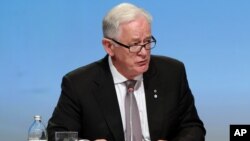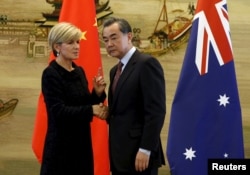As a long mining boom comes to an end, Australia is pinning its economic hopes on a free-trade agreement with China that came into force in December 2015.
While tariffs have been cut, opportunities have soared. But there is still a beguiling maze of cultural differences that remains to be negotiated between the two trading partners.
There was triumph in the air when Australian Prime Minister Malcolm Turnbull announced the signing of a “historic” free trade agreement with China. One of the deal’s main architects is the former trade minister, Andrew Robb.
Robb admits that cracking the Chinese code of Guanxi, or the nurturing of long-term business relationships, is a critical challenge.
'Not understanding the culture'
“The other constraint is, you know, not understanding the culture, not having an awareness of how business is done, the cultural norms, the things that we take for granted in our own country, well, China is no different," he said. "They’ve got a whole lot of things they take for granted. We need to have that mutual understanding, mutual respect for the differences, and then once you do that then you have got an opportunity to really maximize the relationship."
Chinese New Year is a glittering spectacle in Sydney. The cultural, social and commercial ties between Australia and its biggest trading partner have never been stronger. But it can be tough for foreigners to unlock the secrets of doing business in China. Do you shake hands before a meeting? Will pointing a finger during a conversation cause offense? And should you bring a gift, and, if so, what kind? Several companies now offer tailored cultural training for executives.
"If a Chinese business person gives their business card to me, I have to receive it with both hands and I need to make sure that I’m not putting it in any kind of indecent place, and by indecent I mean even if I put it in my back pocket, that is not okay because then when you sit down you are sitting on their name, which is disrespectful," said Della Dang, a marketing specialist at the Australia Asia Executive Center.
Bridging the cultural gap
Monika Tu sells multimillion-dollar real estate in Sydney to Chinese buyers. She moved to Australia from southern China in the late 1980s, and said bridging the cultural gap hasn’t been easy.
“You know, I have been here for 27 years. It take me a lot of time to really get the essence of what Australian or Westerner people have [and] has to offer as well," Tu said.
"It is just so different. But I think if you learn both cultures, take the initiative, you really enjoy it. That will benefit your social life, and your lifestyle and also importantly, will help your business. It is a long way for us to go, so everybody will have the opportunity to work together and to make a beautiful world," she added.
Australian companies looking to expand into China are hoping this first year of the new free trade agreement will be fortune-changing. But academics warn there are pitfalls ahead.
Cultural understanding
Sally-Anne Gaunt, the senior lecturer for cross-cultural management at the University of New South Wales, said, in parts of Asia, Australians are not seen as hard-working, and she recalls giving advice to an executive in Singapore.
“This young lady was very critical of her client, saying they are lazy, they all go home at 5 o’clock, they all go to the beach and we’re here working very, very hard," Gaunt said. "Of course what she failed to realize is when you are working somewhere like Australia, you do not have an extended family, you don’t have home help, you really have to do everything yourself.
"When I actually started to point these factors out she was absolutely shocked. She went ‘Oh, do you mean you do not have maids in Australia?’ I said ‘Well, no. Many people do not.' "
Australia is party to 10 free-trade agreements. Most are in its backyard in Asia, including Japan, South Korea and China. Taking advantage of the opportunities they offer is not just about products, prices and performance, but understanding the complex cultures that make businesses work.






